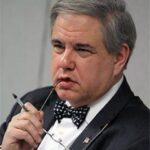Midway through 1988 my boss at the time, Edwin Meese III, was finally cleared by an independent counsel of false and vexing charges growing out of sundry scandals, some real and some fabricated, of the politics of the 1980s. Thus vindicated, Mr. Meese, exhausted after nearly eight years of work at the right hand of President Reagan at the White House and then as Attorney General, retired from government service. He was succeeded at the Department of Justice by Richard Lewis “Dick” Thornburg, who became the 76th Attorney General of the United States.
Mr. Thornburgh asked me to stay on, continuing in my role, as I had for Mr. Meese, as Assistant Attorney General in charge of international liaison and liaison with State and local law enforcement. There were six months remaining in President Reagan’s administration, at the end of which President-elect Bush asked Mr. Thornburgh and his team to stay on. Mr. Thornburgh remained as Attorney General under President Bush (41). I elected to leave with President Reagan, and I returned home to Chicago.
During my six months at Mr. Thornburgh’s elbow I came to respect him highly. He continued, in my sphere of responsibilities at least, the policies of Mr. Meese, which had been extremely successful and effective in promoting America’s national security and in developing high levels of productive cooperation among Federal, State, and local law enforcement agencies. Mr. Meese had set the Department’s legal policy-makers and litigating advocates on the course that has born great fruit in the intervening decades in the development of what has come to be known as the “originalist / textualist” school of jurisprudence, and Mr. Thornburgh continued on that course, at least through the remainder of what I witnessed during the Reagan Administration.
Mr. Thornburgh as a man and as an organizational leader was, like his immediate predecessor, kind, thoughtful, patient, diligent, clear-spoken, and genuinely caring about his colleagues and staff as human beings. I observed that, as did Mr. Meese, he accepted policy disagreements with courtesy, and he encouraged his staff to disagree and argue with him — respectfully and constructively, of course. As a public man he strove to be principled and faithful to his duties. His love of country and his American patriotism were exemplary. Although his Americanness was thorough-going, he remained a passionate and devoted citizen of his home State, Pennsylvania, an attribute that, good federalist that I am, I found particularly admirable.
He cared deeply about his own family, and had known his share of personal tragedy. He bore those pains and scars with dignity. (His first wife, the mother of three of his four children, was killed in a traffic accident that left one of his sons seriously and permanently injured. His second wife, who bore him his fourth child, gave him comfort and joy that he could not conceal.)
Mr. Thornburgh died on New Year’s Eve. The on-line service of The Wall Street Journal today published the Associated Press’s report on Mr. Thornburgh’s death. You will find it linked and set forth below.
The death of Dick Thornburgh is a sad matter for all who knew him, and marks the loss by the American people of a conscientious public servant. May his memory always be as a blessing.





